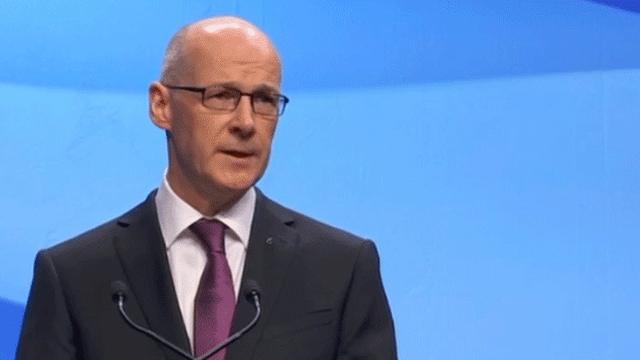SNP conference: John Swinney to give Scottish councils business rate powers
- Published

John Swinney told his party's conference that the change would happen in two weeks' time
Scotland's Deputy First Minister, John Swinney, is to give councils north of the border the power to cut business rates from the end of this month.
He announce the decision in his speech to the SNP's annual conference in Aberdeen.
Business rates are set centrally in Scotland and retained locally, but Mr Swinney wants greater flexibility.
From 31 October, Scotland's 32 local authorities will be able to cut rates to try and boost economic activity.
They will be able to apply any changes in particular geographical areas or to chosen business sectors.
The move will be made possible under an order laid at Holyrood by Scottish Ministers.
The order, which uses powers under the Community Empowerment (Scotland) Act 2015 that passed in June of this year, means councils will be able to reduce rates bills based on criteria they choose, such as the type of property, its location, occupation or activity.
'Real control'
The announcement follows a rise in Scottish unemployment and a slowdown in economic output.
Mr Swinney said the Scottish government was committed to giving communities "real control over their own futures".
He added: "We have already set a strong platform nationally by delivering the most competitive business taxation in the UK; for example the Small Business Bonus Scheme alone reduces or removes business rates for more than 96,000 properties.
"Scottish councils will be able to use these powers from the end of this month and, in contrast to England, will be able to retain all the business rates they collect.
"With these new flexibilities councils could, for example, use their local knowledge to attract new investment into town centres and help create vibrant communities where people want to live, socialise and do business."
'Important power'
First Minister Nicola Sturgeon - who wants Scotland to be the most attractive place in the UK for business - said the move had been welcomed by councils.
She told BBC Radio Scotland's Good Morning Scotland programme: "This is an additional power to allow councils to decide if they want to set a lower rate as part of an effort to generate more economic activity in their area.
"It is an important power to be giving local authorities and it is part of our effort to de-centralise and devolve power to local communities. We want power to lie as close to people as possible and this is an illustration of putting that into practice."
The announcement was welcomed by local government organisation Cosla as a "positive start to the journey on increasing local flexibility of funding and taxation powers for councils."
But the organisation said its ambitions were "much greater".
'Out of date'
Liz Cameron, chief executive of Scottish Chambers of Commerce, said: "It is good news that local authorities are being given additional powers to help reduce the costs of doing business in Scotland.
"Our hope is that local authorities will make use of these new levers to help reduce the burden of business rates, which has grown substantially in recent years."
David Martin, head of policy and external affairs at the Scottish Retail Consortium, said: "The current system of business rates has become a tax on jobs and growth and undermines investment in property, especially in town centres and high streets.
"There is a strong and growing consensus across business and industry that the current system is out of date and no longer fit for purpose."
Colin Borland, the Federation of Small Businesses' (FSB) head of external affairs in Scotland, said it was good news that cutting the cost of doing business was "at the heart of the deputy first minister's message".
'Warmly welcomed'
He said: "If used appropriately, these powers could give local economies a welcome boost and it will be interesting to see how many hard-pressed councils will be able to take advantage of them."
David Watt, executive director of the Institute of Directors Scotland, said: "The announcement will be warmly welcomed by businesses across Scotland.
"We hope this new deal will pave the way for councils to use these new powers to attract businesses, encourage start-ups in new industries, and regenerate high streets."
UK Chancellor George Osborne has promised local authorities in England more flexibility over business rates by 2020.
- Published15 October 2015
